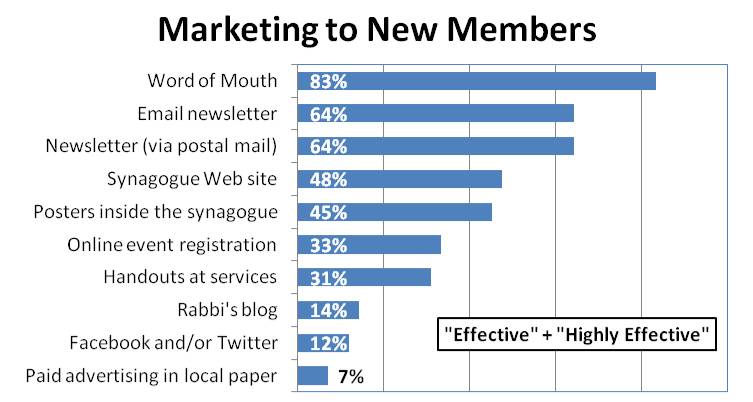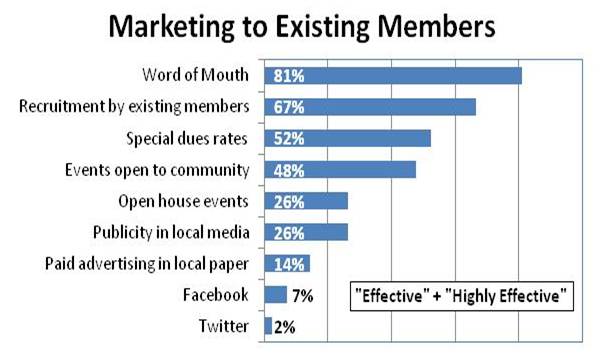Presented to The Future of Jewish Non-Profits Summit, July 11, 2011, Chicago, Ill.
When it comes to synagogue marketing (and very possibly marketing churches, too), technology is trumped by the old stand-by: personal contact. Paid newspaper advertising doesn’t seem to work well, and the jury’s still out on the effectiveness of social media.
As a lifelong professional communicator, and former president of Beth Hillel Congregation Bnai Emunah in Wilmette, Ill., I constructed an informal survey (using Google Docs) which I sent to Chicago-area synagogue executive directors and randomly selected rabbis, as well as Conservative synagogue presidents on a national listserve.
Facing competition from the Internet, iPads, the golf course and other non-religious distractions synagogue leaders are eager to find marketing techniques that will engage current members and attract new people, without draining the temple’s resources.
What’s working and what isn’t
My survey was intended to spark a discussion, but my method was neither “scientific” nor comprehensive.
Respondents were asked to rate the effectiveness of each tactic shown, on a scale of Very Ineffective, Ineffective, Not Sure, Effective and Very Effective. The charts show the percentage of respondents selecting Very Effective OR Effective.
In the first chart below, “new members” refers to prospective members. Since they are not yet members of the congregation, some of the tactics needed to reach them are different from what might work with current members.


Email usage is high
Use of email in congregations is widespread but not universal. Only 5 percent of respondents estimated that all of their members use email regularly, while most said the proportion of people on email was more like half or three-quarters of the congregation.
Social media is used, but not necessarily useful
Synagogues are using Facebook but the value hasn’t been established. Four out of five have a Facebook page, and at least half have a separate page for their youth group. But more than 50% said they weren’t sure whether Facebook (or Twitter) was an effective marketing tool.
It seems to me that Facebook is (or should be) the ultimate cost-effective word-of-mouth marketing tool. If word-of-mouth is so effective in synagogue marketing, shouldn’t Facebook be effective, too?
I’ve got a few ideas on how to use Facebook as a word-of-mouth marketing tool.
Marketing and promotional techniques that work in synagogues
In open-ended questions, several of my respondents mentioned these additional techniques that have been successful:
- Make the synagogue Web site more interactive
- Label some email newsletters as “Special Notice” from the rabbi
- Mailed postcard listing multiple events
- Full-time membership/marketing person on staff
- “Robo” calls or automated phone calls
- Weekly press releases to local paper
- Train support staff on how to speak to prospective members
- Creative programming, events outside the synagogue (“Shabbat at the Beach”)
- Lower dues to certain groups
- Community event participation (float in local parade)

June 21, 2015 at 11:54 am
Hi,
I’m currently on the Board of Directors of the Shul, and more specifically on the Membership Sub Committee. I’m trying to put together a needs assessment for current members and prospective members. Can you help with particular resources I could use to develop my questions. Have you done such an assessment?
Thanks for any help you can offer.
Ron Trieff
June 21, 2015 at 1:39 pm
Hi, Ron,
In planning your needs assessment you are already ahead of the game — the leaders of many organizations are not fully in touch with what their members are thinking. And this (obviously!) can have a negative impact on member acquisition and retention. In my experience, both quantitative analysis (mass surveys) and qualitative outreach (focus groups and one-on-one interviews) are necessary to get a full picture. As well, it’s a good idea for some members of the board to observe or participate in activities outside of their normal circles. For example, some members of the leadership may not have been in the Hebrew School since their kids’ bar mitzvahs 20 years ago. Sitting in on a class, talking to some of the parents and teachers will produce useful information. I will privately send you a survey instrument I recently worked on, and share other resources that might be helpful.
– Jonathan Lehrer